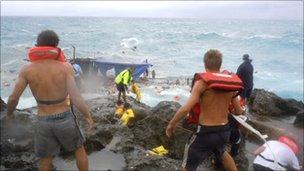Reality TV tackles immigration
- Published
- comments

Generally when the sons and daughters of Australian immigrants appear on prime-time reality television shows it is with a cooking utensil or a recipe in hand (good food, combined with self-deprecatory humour, have long offered new arrivals here the quickest route to acceptance and assimilation).
For three consecutive nights this week, however, the Australian network SBS has applied the methods of the reality show genre to the thorniest of political issues - the arrival of immigrants by boat - offering viewers a fly-on-the-wall insight into both the homes of Congolese and Iraqi families, and also their troubled homelands.
The cameras were there to film six Australians with strong views on asylum seekers as they embarked on a refugee journey in reverse.
First stop was the home of a family of Iraqi asylums seekers who have settled in south-western Sydney, and a family from DR Congo who now live in Albury on the border between New South Wales and Victoria. Ultimately, the six Aussies ended up in the Middle East and Africa.
A blend of Big Brother, Survivor and The Amazing Race - with a voiceover that could almost have been scripted by the UN refugee agency - Go Back to Where You Came From has been the must-watch show in Australia this week, and by far the most talked about.
In that modern-day gauge of instant popularity and consequentiality, it trended on Twitter both in Australia and globally. For a time, Twitter suggested it was the world's most talked about subject, which is more an indication of its huge impact here.
Would this be a journey of personal discovery - or even something Damascene - was the question asked throughout. Or would the prejudices and existing views of the participating Aussies merely be reinforced? A question has been asked of viewers as well: could you walk a mile in a refugee's shoes?
You can get a flavour of the show from its introductory tease.
"They need to go straight back," says Adam from Sydney. "We've had floods, cyclones, fires, and we're spending millions of dollars on housing these criminals."
"People who come here without any documentation by boat should be immediately expatriated," says Darren from Adelaide.
"Australia should be Australian, just like Africa is African and Asia is Asia and America is America or whatever. Australia should be Australia and it shouldn't be so multicultural."
Those are the words of 21-year-old Raquel, the kind of interviewee known in the television business simply as "gold". Even the comedian and social satirist Chris Lilley, of Angry Boys fame, might have blanched at repeating some of her views.
Reality, not TV
In a speech in Sydney last year, where she tried to elucidate the immigration issue, Prime Minister Julia Gillard said that the debate "should not be constrained by self-censorship or political correctness".
The comment needs to be put in context of the full speech. Five of the six participants in the TV show have taken her at her word.
We have spoken many times before about the strangely paranoiac public, political and media reaction to the sight of people trying to reach Australian shores.
Most of the foreign press corps in Australia covers the immigration issue not as a numbers story - for, globally speaking, the tally of unauthorised arrivals is fairly insignificant - but as a reaction story: why does such a comparably small issue generate such a big and angry national debate.
The participants in Go Back to Where You Came help provide some of the answers. It is also worth bearing in mind that these are empowered voices: these kinds of views have done much to frame the political debate.
As a piece of television, it was an exceptional piece of work. As a social experiment, it was hugely insightful.
There have been complaints that it was contrived. But by its very nature it had to be. Two of the six participants had never left Australia, still less visited a troublespot. How else were they going to find out where refugees came from unless the producers of the show took them there?
One of the participants said they were being subjected to "enforced empathy" - an argument tackled in a Sydney Morning Herald opinion piece.
It is also worth pointing out that Australia is successfully multi-ethnic and, considering the massive population changes that have overtaken the country over the past 60 years, the backlash has been relatively mild. The Cronulla riot was an aberration. Hansonism was short-lived, with its one-time figurehead now a figure of fun.
For those who believe that the national debate over boat people should become a lot less shrill and a lot more compassionate, perhaps the biggest drawback of the programme was that it was preaching to the converted. For SBS, this programme delivered big ratings, but it was not mass market television.
Perhaps the most intriguing character was Raye Colby, a 63-year-old former social worker from South Australia, who has seen an immigration detention centre opened on her doorstep.
"When the boat crashed coming into Christmas Island I thought, serve you bastards right," she said at the beginning of the programme. "Come the right way and it wouldn't have happened."
I spent time with Raye the other day and she was unrecognisable from the woman we saw at the beginning of the programme. She still has certain problems with the manner in which some immigrants arrive, but she spoke with a much more tender heart about their situation.
Her moment of epiphany came when she first met the Masudis, a Congolese family in rural New South Wales, and listened to their harrowing testimony.
The glib thing to say is that Raye is a case study in the transformative power of television. But what she experienced was reality, not TV.
- Published17 June 2011
- Published16 December 2010
- Published19 August 2010